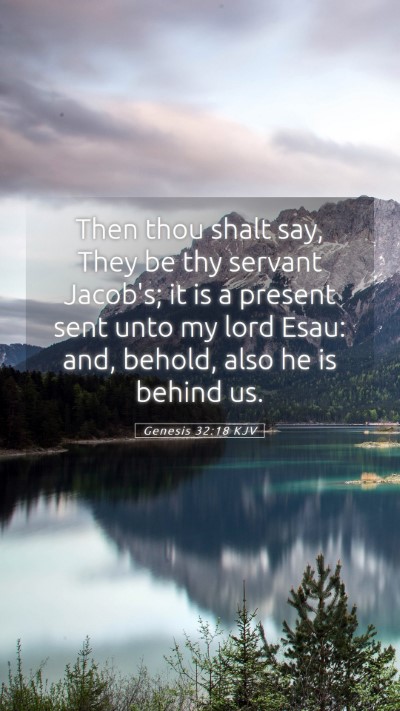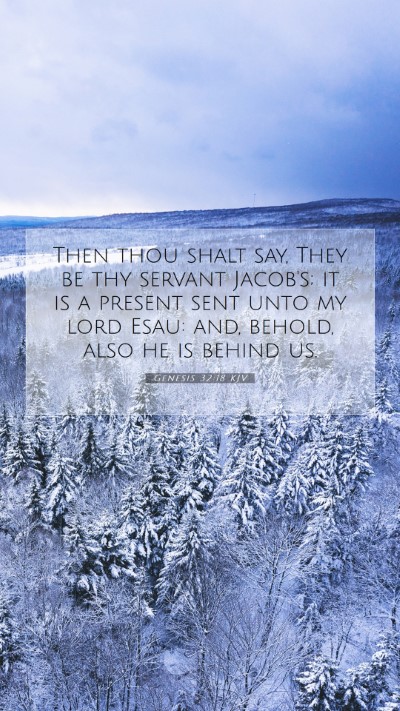Understanding Genesis 32:18
Genesis 32:18 states: "Then you shall say, 'They belong to your servant Jacob; they are a present sent to my lord Esau; and behold, he also is behind us.'" This verse captures a critical moment in Jacob's life as he prepares to meet his estranged brother, Esau, after many years apart.
Bible Verse Meanings
This passage is significant in understanding the themes of reconciliation and humility. Jacob, feeling the weight of his past deceit towards Esau, sends gifts ahead of him to appease his brother. This act signifies:
- Recognition of Past Wrongs: Jacob acknowledges the grievances between him and Esau, understanding the need for clearing the air.
- Humility: By sending gifts, Jacob is demonstrating humility and respect for Esau, who he considers his lord, indicating a position of deference.
- Desire for Reconciliation: The gifts represent Jacob's hope to mend relationships, emphasizing the importance of peace over pride.
Bible Verse Interpretations
When analyzing this verse, it is crucial to consider Jacob's character transformation throughout the narrative. The insights from Matthew Henry's Commentary reveal how Jacob's actions reflect a changed heart seeking forgiveness:
- Matthew Henry: He emphasizes the power of humility and the readiness to make amends before facing others, as Jacob does prior to encountering Esau.
- Albert Barnes: Barnes notes the strategic nature of Jacob’s gifts as a means of softening Esau's heart, showcasing the practical wisdom in seeking reconciliation.
- Adam Clarke: Clarke discusses the broader implications of Jacob's act, illustrating how it illustrates God's providence and Jacob's evolving faith.
Bible Verse Understanding
This verse encourages believers to reflect on their past relationships and the need for addressing unresolved conflicts. It serves to remind us the importance of making efforts towards reconciliation in our lives.
Bible Study Insights
In a Bible Study Group, this verse can lead to discussions about:
- The nature of forgiveness and the steps we can take to reconcile with others.
- How humility can open doors to healing previous wounds.
- Strategies for addressing past wrongs in a constructive manner.
Historical Context
Understanding the historical context of Genesis 32:18 is essential for deeper insight. Jacob's previous deception of Esau over the birthright and blessing is crucial:
- This passage occurs at a pivotal moment where Jacob is returning to his homeland, facing the consequences of his past actions.
- The act of sending gifts can be seen as a traditional gesture in ancient Near Eastern cultures, aimed at securing favor and demonstrating respect.
Application of Genesis 32:18
Applying this verse to our daily lives, we can learn the importance of:
- Addressing conflicts before they escalate.
- Making efforts to reconcile with those we've hurt or offended.
- Embracing humility as a means of overcoming pride and seeking forgiveness.
Cross References
This verse is related to several other passages that explore themes of reconciliation and humility:
- Philippians 2:3-4: Emphasizes humility and considering others above ourselves.
- Matthew 5:23-24: Advises leaving our offering at the altar to reconcile with a brother.
- Luke 15:20: The parable of the prodigal son demonstrates reconciliation and forgiveness.
Final Thoughts
The insights from Bible Verse Commentary shed light on the necessity of understanding scripture within its historical context. As we strive for Bible study insights, Genesis 32:18 offers timeless lessons on humility, reconciliation, and self-awareness that remain relevant in our spiritual journeys.


